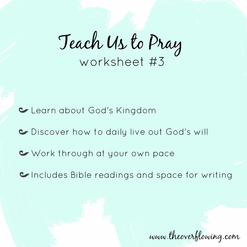|
Prayer requires getting to know God. The real God. Our Father in heaven. The One whose Name is Hallowed. We recognize who He is and we surrender to who He is.
That is proseuchomai. The praying to know God more and grow in relationship with Him. Moving toward. Moving forward. To continue in this movement, we will continue through the Lord’s Prayer: “Our Father in heaven, hallowed be Your Name, Your kingdom come, Your will be done, on earth as it is in heaven. Give us today our daily bread. And forgive us our debts, as we also have forgiven our debtors. And lead us not into temptation, but deliver us from the evil one.” Matthew 6:9-13, NIV, emphasis added. That italicized phrase is a short one, but it is in no way a small one. Outlining this post was difficult, because there is just such depth in that phrase. I could write more than a single post from it. Stop and ponder those 14 words for a moment. Take a minute to delve into the deep. This is where the prayer really goes beyond talk. This is where the action begins. We pray for God’s kingdom to come. That it would His will being done. In Matthew 6, as Jesus speaks to His disciples about not worrying, He says this: “But seek first His kingdom and His righteousness, and all these things will be given to you as well” (vv. 33) Instead of becoming consumed with material comforts and pleasures, we are to seek God’s kingdom. Seek is a word of action. A word of effort. A word of movement. It comes from the Greek word zeteo, which in this particular verse means “to strive after, endeavor, to desire.” It does not mean we are playing a game of hide-and-seek, with God’s kingdom being concealed, and us attempting to locate it. Rather, this verse commands us to live with God’s kingdom, His rule and reign, His purpose and plan, as that which we are striving for and desiring above all else. Eyes fixed on Him. Ears listening to Him. Heart seeking Him. For God’s Kingdom is a matter of the heart. And having His Kingdom come, His will be done, must be the desire and endeavor of our heart. But is it? Do we really desire His will in our own lives? His will to be done in our own lives as it is in heaven, where it is carried out immediately and willingly, without hinderance or distraction? Because when I pray, I can get wrapped up in praying for my own comfort. And praying that God’s will be done can be scary, because what if…? What if it is His will that I don’t get that dream job? That I don’t get married? That I have to move far away from my family? That I’m called to minister in difficult, awkward and even frightening situations? I know in this praying for God’s Kingdom to come, I have not arrived. I’m still striving and endeavoring and desiring. But that is what Jesus asks of us. He asks us to seek. And He promises that when we seek, we will find and He will reward (Matthew 7:7-8, Hebrews 11:6). In Mark 3, Jesus makes this statement: “Whoever does God’s will is my brother and sister and mother.” At first, His saying this may seem a slight to His physical mother and brothers, who were outside wanting to see Him (Mark 3:31-35). But this declaration was really a promise and invitation to all people. An invitation to join the family of God. A promise that when we take God’s Name, being transformed into His likeness, we are enabled to do His will. Romans 12:1-2 says this: “Therefore, I urge you, brothers and sisters, in view of God’s mercy, to offer your bodies as a living sacrifice, holy and pleasing to God—this is your true and proper worship. Do not conform to the pattern of this world, but be transformed by the renewing of your mind. Then you will be able to test and approve what God’s will is—His good, pleasing and perfect will.” Part of God’s Name, His character, is His mercy. The fact that He “does not treat us as our sins deserve or repay us according to our iniquities. For as high as the heavens are above the earth, so great is His love for those who fear Him; as far as the east is from the west, so far has He removed our transgressions from us” (Psalm 103:10-12). As we recognize the love God lavishes, the grace He pours out, the mercy He bestows, we have to choose how we are going to respond to Him. In the verses above, we are urged to respond by offering our bodies as a living sacrifice. In this passage, the word “bodies” comes from the greek soma. Soma is “the body as a whole, the instrument of life” and “the complete man”. A complete giving of our complete selves. Holding nothing back. Offering all. Holy and pleasing. We are not called here to be perfect, to have it all together, but to simply offer ourselves. We are urged to do this because it is our “true and proper worship”, our letting His Kingdom come in our own lives, our submitting to His will. The pattern of the world is one of self-seeking, but we are to be transformed, setting our hearts and minds on things above (Colossians 3:1-2), seeking God. (For more on renewing the mind, see this post.) In seeking Him, not only do we pray, “Your will be done”, but we are also able to discern His will, to know the plan He has for us, the direction we are to take. And we see that His will is good, pleasing and perfect. The best. This is a promise for us. In light of this promise, it no longer seems so scary, so overwhelming to pray, “Your will be done.” Praying, “Your Kingdom come, Your will be done on earth as it is in heaven” starts with our offering ourselves to God. Starts within our own hearts. And as our hearts seek Him, we find Him, Our Father in heaven drawing near to us.
The post Teach Us to Pray: Your Kingdom Come first appeared on The Overflowing
All Scriptures take from the NIV Greek origins and definitions taken from The New Strong's Expanded Exhaustive Concordance of the Bible by James Strong, Copyright 2010
0 Comments
Leave a Reply. |
|





